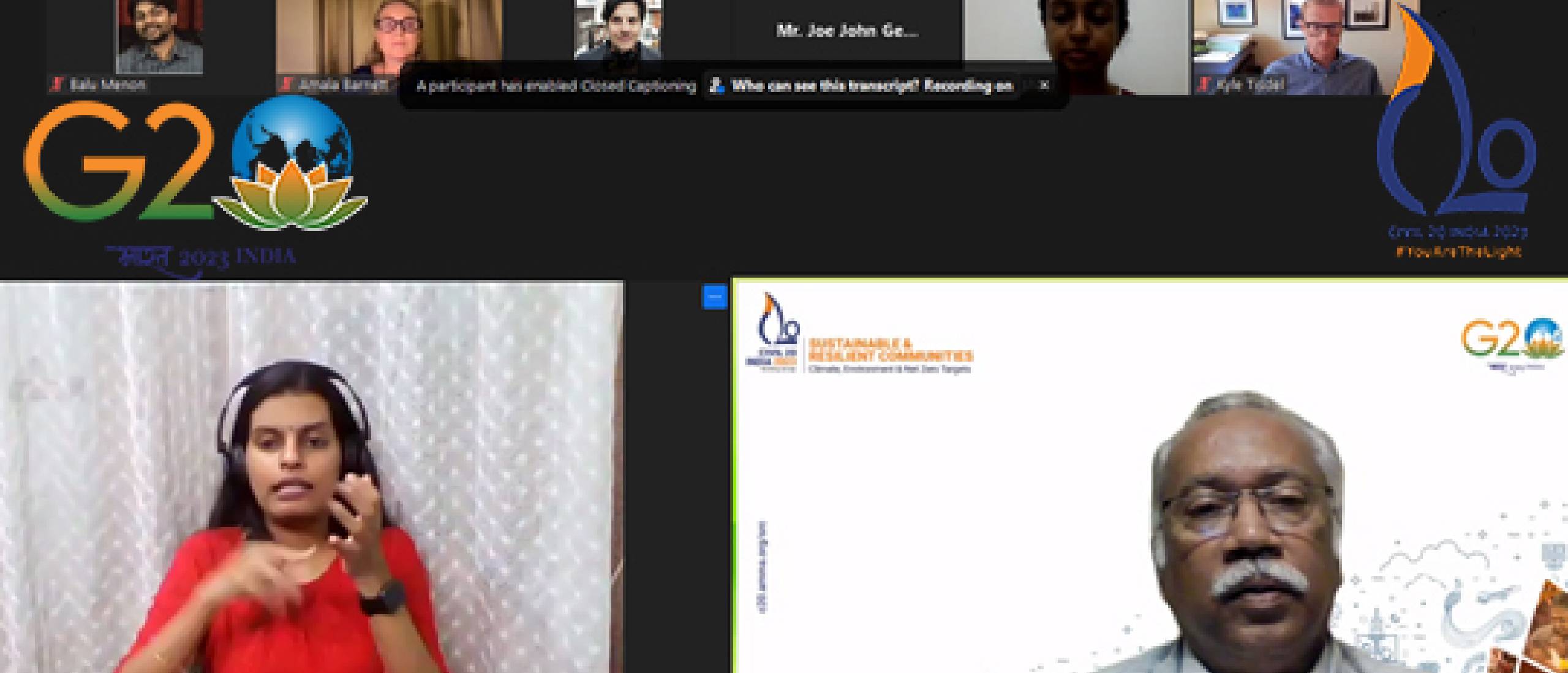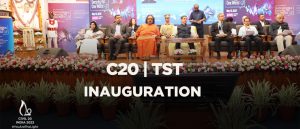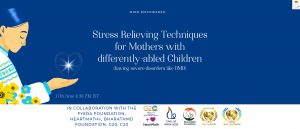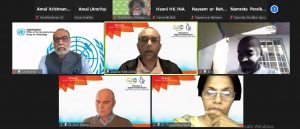An online Policy Consultation on Disaster, Climate Change and the Environment: Impacts on Women and People with Disabilities took place on April 12, 2023. Over 70 participants, representing 16 countries —Sri Lanka, Finland, Nigeria, Thailand, Sweden, Indonesia, Australia, Nepal, Argentina, Belize, Ireland, UK, France, Spain, India and the US — engaged in the conversation.
The event began with a welcome by Ms. Amala Barnett, Disability sub theme lead for the Gender Equality & Disability Working Group. This was followed by opening remarks from Professor N. Vinod Chandra Menon. Prof. Menon has more than 36 years of working experience with a quarter century of experience in disaster risk reduction, climate change adaptation and public policy analysis at the national, regional and global levels. In his remarks Prof. Menon addressed the context and increasing frequency of disasters, global frameworks for development pathways, trends of worsening climate change, and the impact of disaster and environmental degradation on women and people with disabilities. He called for the strengthening of risk governance and preparedness and for the greater investment in multi-hazard preparedness and disaster risk reduction.
The opening remarks were followed by a keynote address from Dr. Sekhar L. Kuriakose, of the Kerala State Disaster Management Authority, the State level statutory apex body for disaster management, who serves in various high level government committees and several national committees on disaster management. Dr. Kuriakose Gender spoke about different kinds of inequalities, being economic, social, and based on caste or tribe, and demonstrated how the state’s disaster management authority has worked to address these issues at different levels. He concluded by illustrating many inclusive approaches that have been taken by the government to help people with disabilities during disasters.
The event moved on to presentations from the distinguished panel, starting with Ms. Annie George, a development and management professional of over 30 years, who is currently focusing on disaster management. Ms. George gave an in depth presentation highlighting the disproportionate negative effects on women during emergencies. Due to their dependence on others and limited decision-making power, women are often at higher risk of harm and much more vulnerable. For a successful and inclusive disaster management plan, she emphasized the importance of understanding the intersectionality of disability and gender, the need to include women and women with disabilities in disaster preparedness, and for a coordinated multi-sectoral approach toward post-disaster management.
Our next speaker was Dr. Oshani Silva who has focused her academic training and post-doctoral research on the health sector of disaster management. Dr. Oshani presented about the problems women and children face post-disaster, highlighting the increase of gender-based violence, child marriage and child sexual abuse. She advocated that a survivor-centered rights-based approach is the most successful method for addressing the injustices seen by those who are most vulnerable and most successful for healing and empowering both women and children.
Next Mr. Joe John George, a development professional who has been working in the field of disaster risk reduction and climate action for over 16 years, spoke on disability inclusive Disaster relief planning. He provided examples of people with disabilities who had received assistance due to state initiatives, and also highlighted the Handbook for Disaster and Disability that the state of Kerala commissioned him to write. He highlighted areas of vulnerability, and the need for more care to address special needs, such as the loss of assistive devices in floods, for sign language videos and PSAs, for special helplines and call center for deaf people, and for the development of other disability friendly training materials to help people with disabilities to better prepare for disasters.
Our fourth and final speaker was Mr. Jason Strother, a US Fulbright Scholar and multimedia journalist, who received a South and Central Asia Regional Research award to examine how climate change impacts people with a disability in India, Sri Lanka and the Maldives. Mr. Strother presented in depth using his PPT to highlight the vulnerability of people with disabilities during disaster.
Sign language interpreters were present for the entire duration of the event, along with Closed Captions for people with hearing disabilities.




